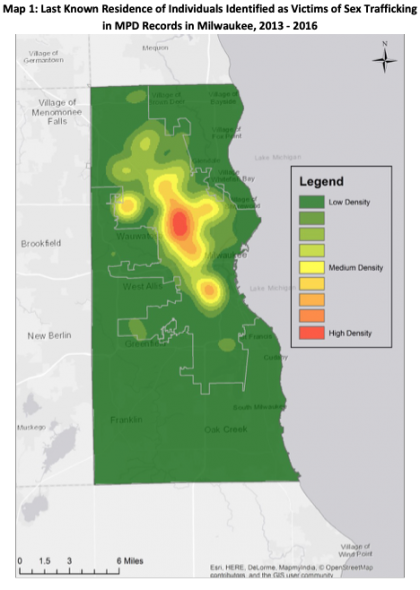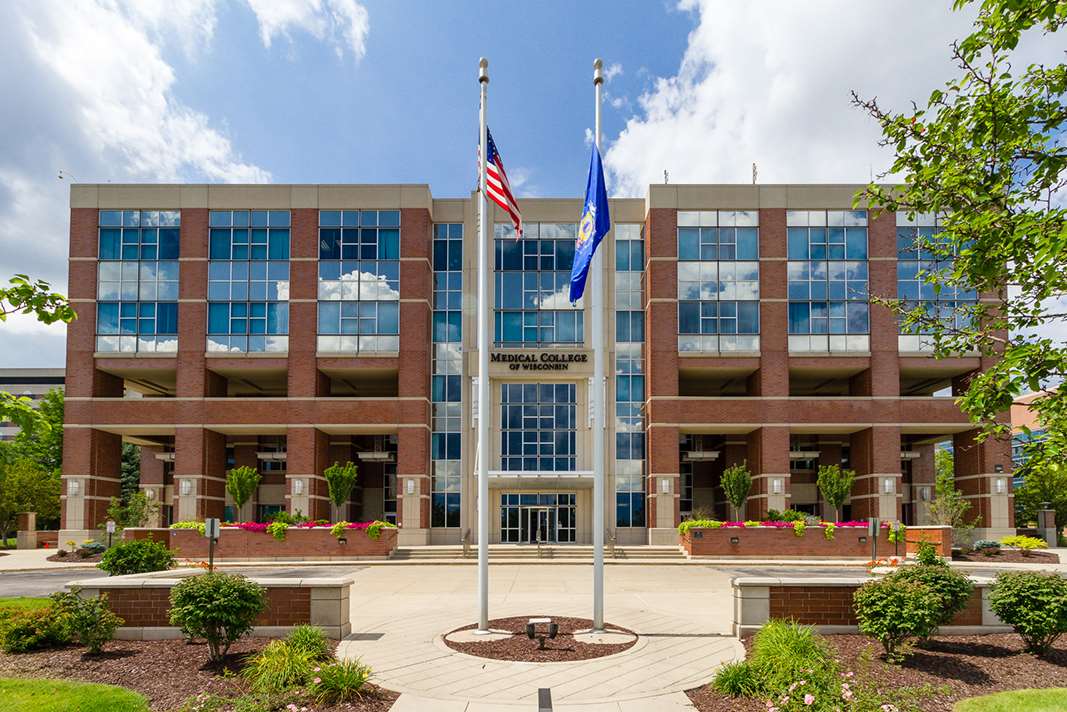Multi-Agency Collaboration Updates Sex Trafficking Report
Analysis of the Geospatial Characteristics of Sex Trafficking in Milwaukee Seeks to Inform Further Responses to Trafficking
Milwaukee, April 7, 2020 – The Milwaukee Homicide Review Commission (MHRC), the Medical College of Wisconsin (MCW) Institute for Health and Equity, Milwaukee Sexual Assault Review and Milwaukee Police Department’s Sensitive Crimes Division are releasing today a report that examines the geospatial characteristics of sex trafficking of juveniles and young adults in the city of Milwaukee from Jan. 1, 2013 to Dec. 31, 2016. This report supplements a March 2018 report the group published that estimated the magnitude of sex trafficking in Milwaukee.
The report is intended to provide perspective on where known sex trafficking incidents were occurring in Milwaukee. Identifying the location of trafficking incidents supports a more targeted approach to prevention, intervention and suppression. Multiple analyses were conducted based on the initial 231 individuals analyzed in the 2018 report. The first analysis examined the last known residence of victim, which allowed the research team to determine if victims are trafficked in their own neighborhoods or elsewhere. Of the 228 individuals with city and state residence information, 97 percent were last known to reside in Wisconsin. The remaining 3 percent last resided in Illinois, Indiana, Ohio, and South Dakota. Of that group, 88 percent last resided in the city of Milwaukee, 9 percent resided in a Wisconsin city other than Milwaukee, and 3 percent resided in a known city outside of Wisconsin. A density map of last known residence shows that most victims last resided in areas of the city with the highest rates of violence and poverty.

Map 1. Last Known Residence of Individuals Identified as Victims of Sex Trafficking in MPD Records in Milwaukee, 2013 – 2016
The second analysis examined where sex trafficking happens in the city, based on incident locations. Hot spots for trafficking incidents were found across the city, including zip codes with high concentrations of poverty and violence such as 53204 on the south side and 53206 on the north side. Other notable hotspots were found in zip codes that have lower rates of poverty and violence, such as 53207, but have characteristics that allow trafficking to flourish, such as hotels and motels near I-94. Beyond the city of Milwaukee, 71 individuals reported also being trafficked in at least 42 cities across 20 states.
“We hope this report continues to build on current discussions and collaboration around the issue and furthers our understanding of sex trafficking in Milwaukee, so we are in a better position to respond and prevent it,” said Mallory O’Brien, PhD, founding director of the Milwaukee Homicide Review Commission and assistant professor of epidemiology at MCW.
The analysis takes a public health approach to sex trafficking, including an analysis of victims, circumstances surrounding the trafficking and environmental factors that may allow sex trafficking to thrive in certain areas. The recommendations generated in this report were developed in collaboration with the Milwaukee Sexual Assault Review, Proactive Outreach for the Health of Sexually Exploited Youth and various group homes in Milwaukee, to ensure the recommendations address the policy needs of criminal justice, medical, advocacy and social service systems that come into contact with victims of sex trafficking.
To continue to build on this information and context for sex trafficking in Milwaukee, the MHRC will collect and analyze additional data for the time period since the initial report, Jan. 1, 2017, to Dec. 31, 2019.
This project was made possible with funding from the Bob and Linda Davis Family Fund.
NOTE: This press release was submitted to Urban Milwaukee and was not written by an Urban Milwaukee writer. While it is believed to be reliable, Urban Milwaukee does not guarantee its accuracy or completeness.
Mentioned in This Press Release
Recent Press Releases by Medical College of Wisconsin
Midwests Only Holistic Brain Injury Treatment Program for Military Veterans and First Responders Adds Staff, Space Due to Rapid Growth
Dec 8th, 2025 by Medical College of WisconsinThe BRAVE program outgrows its initial space in less than two years.
Audaxity Bike Ride Raises More Than $1 Million to Accelerate Cancer Research at the Medical College of Wisconsin Cancer Center
Nov 13th, 2025 by Medical College of WisconsinFunds from the inaugural community ride will help turn discoveries into new cancer treatments, train future physician-scientists, and expand community-driven research efforts.






















